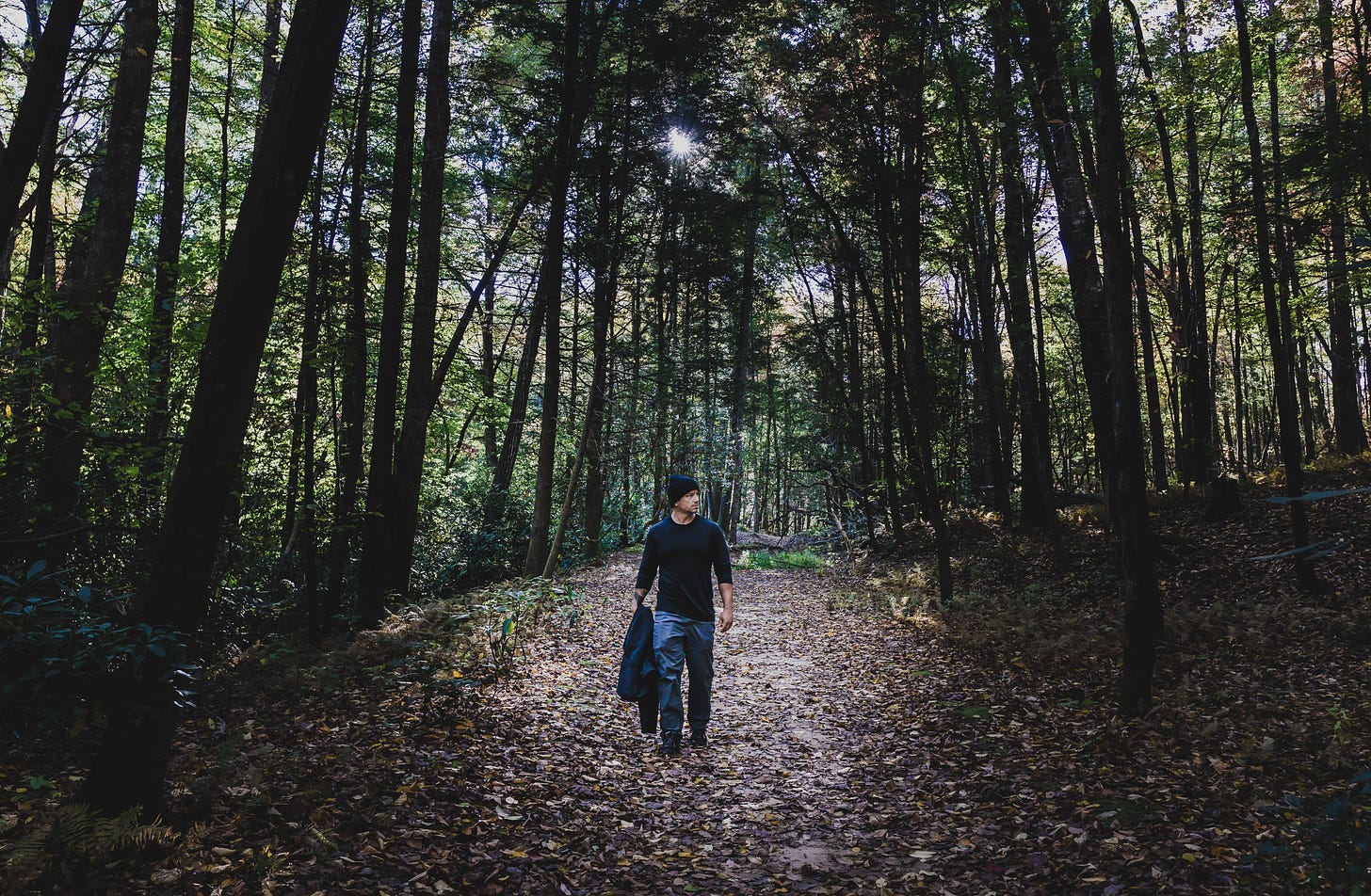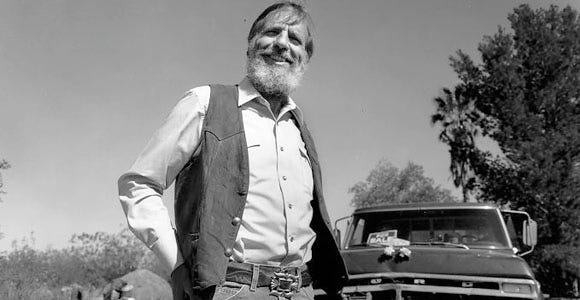If a man’s imagination were not so weak, so easily tired, if his capacity for wonder not so limited, he would abandon forever such fantasies of the supernal. He would learn to perceive in water, leaves and silence more than sufficient of the absolute and marvelous, more than enough to console him for the loss of the ancient dreams.
— Edward Abbey
Trudging through the woods on a golden morning down south. Crisp air. Blue sky stretched wide like an old highway dream. Birds singing sweet tunes high up in the moss-draped live oaks. Rambling along the river’s edge, the water sings beside me, weaving its ancient song through stone and root.
I love these raw, moist mornings when the sun sits low and flickers its rays through the trees. I walk the path between birdsong and breeze. I feel something vast and wordless move through me—a stillness that carries the wild rhythm of water, and the knowing that I, too, am just passing through.
The solitude is sublime out here on this tender morning among the pines, thickets, and budding leaves. The scent of the fresh earth exalts the soul and excites the bones. Thoreau's words ring true: “By my intimacy with nature I find myself withdrawn from man…In society you will not find health, but in nature.”
I’m not entirely alone, though, because I brought a companion in the form of a book by the great Edward Abbey, a kindred spirit and one of my favorite writers. “Cactus Ed” is what they called him, and he was a writer who saw through many of the manufactured illusions of modern life and how it caused people to forget what was truly important.
He saw, more than most, how the bureaucratic hands in the so-called “age of progress” sought to tame the wild within us. To him, the retreat into nature was no mere indulgence, no simple pleasure, but an act of quiet defiance, a return to the self… unburdened.
Wendell Berry once wrote of Abbey:
We are living even now among punishments and ruins. For those who know this, Edward Abbey's books will remain an indispensable solace. His essays, and his novels too, are "antidotes to despair." For those who think that a few more laws will enable us to go on safely as we are going, he will remain—and good for him!—a pain in the neck.
I feel Abbey’s words out here.
I want to share a beautiful passage from his book, Desert Solitaire, a book that is both timeless and timely. I hope you enjoy it.
Wilderness. The word itself is music.
Wilderness, wilderness…. We scarcely know what we mean by the term, though the sound of it draws all whose nerves and emotions have not yet been irreparably stunned, deadened, numbed by the caterwauling of commerce, the sweating scramble for profit and domination.
Why such allure in the very word? What does it really mean? Can wilderness be defined in the words of government officialdom as simply “A minimum of not less than 5000 contiguous acres of roadless area”? This much may be essential in attempting a definition but it is not sufficient; something more is involved.
Suppose we say that wilderness invokes nostalgia, a justified not merely sentimental nostalgia for the lost American our forefathers knew.
The word suggests the past and the unknown, the womb of earth from which we all emerged. It means something lost and something still present, something remote and at the same time intimate, something buried in our blood and nerves, something beyond us and without limit.
Romance – but not to be dismissed on that account. The romantic view, while not the whole of truth, is a necessary part of the whole truth.
But the love of wilderness is more than a hunger for what is always beyond reach; it is also an expression of loyalty to the earth, the earth which bore us and sustains us, the only home we shall ever know, the only paradise we ever need – if only we had the eyes to see.
Original sin, the true original sin, is the blind destruction for the sake of greed of this natural paradise which lies all around us – if only we were worthy of it.
My work and research I put into this Substack Page are entirely reader-supported. If you enjoy the content I provide and are not ready to become a paid subscriber, you can simply make a one-time donation here at Buy Me A Coffee. If you can. I appreciate each one of you who follows this page. You all truly made it into a magical little online community. Thank You.








If you can't go to the wilderness, bring the wilderness to you. On my acre-and-a-half Victorian property in Pennsylvania I lovingly support two giant larches, two 100-year-old Norway spruces, two silver maples with huge trunks that are dying of old age, three massive Osage orange trees that are not, and a locust that is more than 100 feet tall. Plus three black walnut trees, yews, arborvitaes, rhododendrons and other bushes. Living with nature is fun! My wildlife friends think so, too.
"Original sin, the true original sin, is the blind destruction for the sake of greed of this natural paradise which lies all around us – if only we were worthy of it."